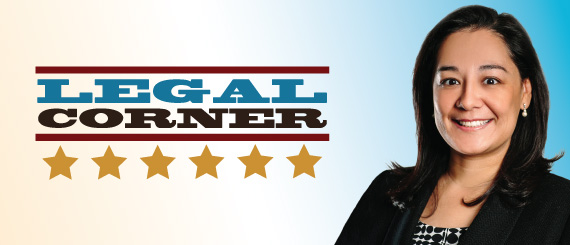
Legal Corner: - U.S. Supreme Court Preview
By Christina Estes-Werther, League General Counsel (Adapted from Lisa Soronen, State and Local Legal Center)
The U.S. Supreme Court is considering many diverse issues this term including a few cases that will directly impact municipalities. Four cases are highlighted below along with additional information on other cases before the Court.
South Dakota v. Wayfair
This decision has the potential of overturning Quill Corp. v. North Dakota (1992), which held that states cannot require retailers with no in-state physical presence to collect sales tax on retail sales over the Internet. In March 2015, in Direct Marketing Association v. Brohl, Justice Kennedy wrote a concurring opinion stating that the "legal system should find an appropriate case for this Court to reexamine Quill." South Dakota passed a law requiring companies with over $100,000 in sales to collects its 4.5 percent sales tax on purchases made by South Dakota residents. Wayfair, NewEgg and Overstock challenged the law requiring remote vendors to collect sales tax. The South Dakota Supreme Court ruled that the South Dakota law is unconstitutional because it violates Quill, but the U. S. Supreme Court has accepted the case for review. If the Court overrules Quill, states and localities will be able to collect sales tax from out-of-state retailers, and local retailers will be on the same playing field as online retailers.
Janus v. American Federation of State, County and Municipal Employees
Mark Janus and Brian Tyrgg, Illinois state employees, filed a complaint alleging that they are being forced to pay fees as a condition of public employment violating their First Amendment rights. In Abood v. Detroit Board of Education (1977) the Supreme Court held that the First Amendment does not prevent "agency shop" arrangements where public employees who do not join the union are still required to pay their "fair share" of union dues for collective-bargaining, contract administration, and grievance-adjustment. Yet the Court has questioned its holding in Abood and recently refused to extend its application in Harris v. Quinn (2014). The Court will determine whether it is constitutional for a government to force its employees to pay agency fees to an exclusive representative for speaking and contracting with the government over policies that affect their profession.
Lozman v. City of Riviera Beach
Fane Lozman was a frequent critic at the Riviera Beach City Council after he learned the City planned to redevelop its waterfront area and take the property under eminent domain. At a city council meeting, Mr. Lozman began speaking about the arrest of former county commissioners and a councilperson had him arrested when he refused to stop talking because he violated the rule that comments must relate to City business. He sued the City claiming they arrested him in violation of his First Amendment free speech rights for opposing the City's redevelopment plan. A jury ruled against Mr. Lozman. The Eleventh Circuit affirmed the jury's finding holding that the officer had reasonably believed Mr. Lozman was committing the offense of disturbing a lawful assembly, and his First Amendment retaliatory arrest claim failed as a matter of law. The Supreme Court will decide whether the existence of probable cause defeats a First Amendment retaliatory-arrest claim. The footage from the city council meeting is available here.
Minnesota Voters Alliance v. Mansky
Minnesota law bans voters from wearing political badges, buttons or other insignia at the polling place that may be designed to influence or impact voting. During the November 2010 election, Andrew Cilek entered his polling place in Hennepin County wearing a "Please I.D. Me" button and a t-shirt made by the North Star Tea Party Patriots. An election worker twice refused to allow Mr. Cilek to vote because these items are prohibited by Minnesota law. Mr. Cliek sued and alleged the law was unconstitutional on its face because it was overboard under the First Amendment. The Eighth Circuit upheld the law. The Supreme Court will decide whether banning political apparel at polling places violates the First Amendment. These are only a few of the many cases the Supreme Court is reviewing this term. The Court is also examining the third travel ban in Trump v. Hawaii, a case about partisan gerrymandering in Gill v. Whitford, and a one-person one-vote claim in Benisek v. Lamone. This Supreme Court term may significantly impact local governments, especially in the cases involving sales tax, collective bargaining and the First Amendment. A summary of the Court's decisions will be provided in late summer following the end of the Court's term.




